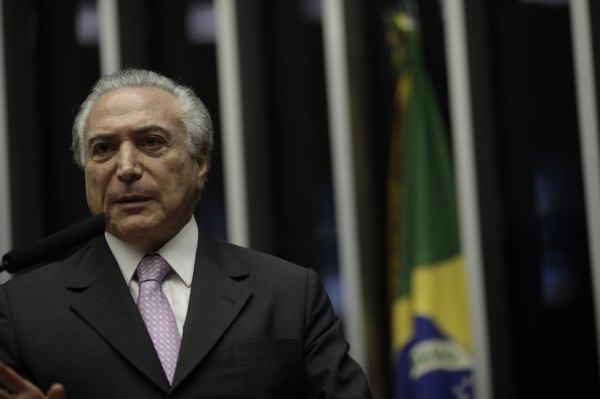By Matthew Taylor*

Brazilian President Michel Temer. / PMDB Nacional / Flickr / Creative Commons
Self-inflicted troubles are forcing Brazilian President Michel Temer into difficult choices between his party and an angry public. When he became president three months ago, his game plan was simple and bold: undertake legislative reforms that would put the government’s accounts back on track, enhance investor confidence, stimulate an economic recovery, and possibly set the stage for a center-right presidential bid (if not by Temer himself, at least by a close ally) in the 2018 elections. Allies in his Brazilian Democratic Movement Party (PMDB) would ensure that he had the backing of Congress to push through reforms that might not bring immediate returns, but nonetheless might improve investor confidence. Sotto voce, many politicians also assumed that the PMDB would be well placed to slow the pace of the bloodletting occasioned by the massive Lava Jato investigation and stabilize the political system.
Last week, the public’s worst suspicions of the PMDB-led government were confirmed by a two-bit scandal that claimed Government Secretary Geddel Vieira Lima, who was putting pressure – with Temer’s help – on a historical registry office to authorize construction of a Salvador building in which he had purchased an apartment. Temer sought to repair the damage by holding an unusual press conference Sunday in which he promised to veto a proposed congressional amnesty of illegal campaign contributions. But Temer now faces another important ethical fork in the road: how to respond to Chamber of Deputies approval of anti-corruption legislation yesterday that – while originally intended to boost efforts to clean up government – neuters the reforms and prevents judicial “abuses,” a move widely seen as an effort to intimidate judges and prosecutors. The bill now heads to the Senate, which seems unlikely to repair the damage and indeed, may further distort the bill in an effort to undermine Temer’s ability to resurrect the reforms through selective vetoes. The reform package had been a poster child for the prosecutors spearheading the Lava Jato investigation, and it was pushed by a petition drive that gathered more than two million signatures. Prosecutors have threatened to resign if Temer signs the severely mangled measure into law.
Despite Temer’s initial successes, the outlook for the remainder of his term remains grim. The bad news is going to continue, causing the Congress and Temer even more sleepless nights. A deal expected soon reportedly will require the Odebrecht construction firm to pay a record-breaking penalty for its corrupt practices (perhaps surpassing even the US$1.6 billion Siemens paid to U.S. and European authorities in 2008), and plea bargains by nearly 80 company executives might implicate as many as 200 federal politicians. It threatens to paralyze legislators and further weaken the PMDB’s already decimated crew, undermining Temer’s ability to coordinate with Congress. Economic forecasts now show economic growth of less than 1 percent in 2017 and, with 26 state governments facing budget crises, politically influential governors are begging for federal help. A much-needed pension reform promised by Temer has not yet been made public, much less begun the tortuous amendment process in Congress. Temer increasingly is being forced to choose between helping his allies and achieving reform, or satisfying a public fed up with politics as usual and baying for accountability and a political cleanup. It will take all of Temer’s considerable political skills and knowledge of backroom Brasília to revise his game plan for these challenging times.
December 1, 2016
* Matthew Taylor is Associate Professor at the School of International Service at American University and Adjunct Senior Fellow for Latin America Studies at the Council on Foreign Relations. This is adapted from this CFR blogpost.

Marcio Cunha Filho
/ December 6, 2016Professor Matthew, thank you for this post.
I agree very much that the rest of Temer’s presidency remains grim. It might actually be shorter than he expected, especially now that it seems he lost Renan Calheiros, former speaker of the Senate.
Is Temer’s outsing of the presidency a real possibility at this point? Which political actors you think are mostly interested in this outcome? Do you think some of them have already begun to articulate the possibility of an impeachment? If that happens, would it mean a complete breakdown of Brazilian institutions?
Thanks again for sharing your thoughts.
Matthew Taylor
/ December 6, 2016Márcio,
It is hard to speculate about the future in the current topsy-turvy environment. But I am not convinced that Renan’s removal is a bad thing, and although it hurts Temer in the short-term (i.e., slowing his reform agenda), it may be good for Temer in the medium term (once the new Senate president is elected in February).
As for the possibility of impeachment, I don’t think it is likely, since Rodrigo Maia is the key gatekeeper, and he has decent relations with Temer, while the centrist governing alliance continues to back Temer more generally.
Meanwhile, I remain cautiously optimistic on Brazilian democratic institutions: not many other countries’ institutions would have been as resilient as Brazil’s in the face of the many challenges of the past three years. There is plenty of institutional friction, and some problems to be worked out, but generally speaking, the institutions seem to be functioning as they were designed.
Best,
M